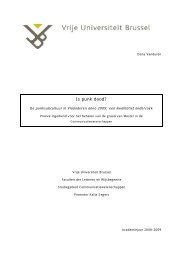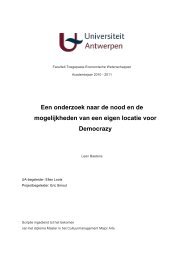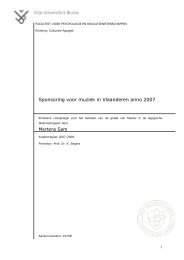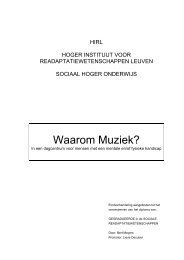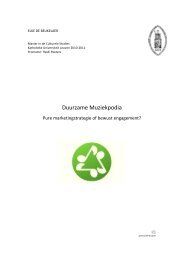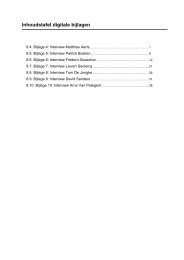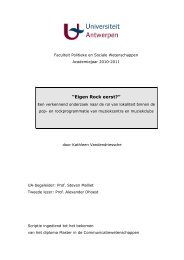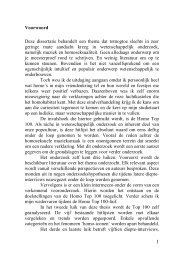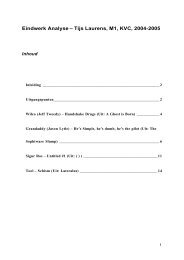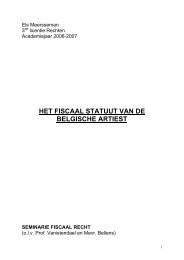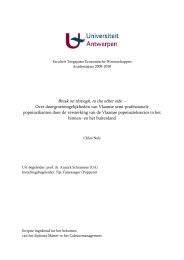Hip hop identity in a township reality. - Poppunt
Hip hop identity in a township reality. - Poppunt
Hip hop identity in a township reality. - Poppunt
You also want an ePaper? Increase the reach of your titles
YUMPU automatically turns print PDFs into web optimized ePapers that Google loves.
Another disparity with <strong>in</strong>group code-switch<strong>in</strong>g (and that goes together with the<br />
latter po<strong>in</strong>t) is that cross<strong>in</strong>g does not arise <strong>in</strong> all k<strong>in</strong>ds of situations. The violation<br />
that goes together with the social boundary cross<strong>in</strong>g produces special moments and<br />
activities when the imperative rules of daily social order are loosened and when<br />
normal social relations could not be taken for granted (Rampton, 1998b: 271).<br />
Those k<strong>in</strong>d of moments can be def<strong>in</strong>ed as be<strong>in</strong>g ‘lim<strong>in</strong>al’, a concept worked out by<br />
Victor Turner <strong>in</strong> his book ‘The ritual process’ (1969). Some examples of these<br />
special moments and activities are: games, the context of perform<strong>in</strong>g art, delicts<br />
and transgressions, jok<strong>in</strong>g abuse, self-talk, response cries, and cross-sex<br />
<strong>in</strong>teraction (Rampton, 1998b: 298) The norms of ord<strong>in</strong>ary conduct are <strong>in</strong>valid at<br />
those moments, they are suspended. To clarify this, we will illustrate this po<strong>in</strong>t<br />
regard<strong>in</strong>g the phenomenon of ‘carnaval’ <strong>in</strong> Belgium (these festivities are comparable<br />
with the American Mardi Gras). Dur<strong>in</strong>g a certa<strong>in</strong> period of the year (end of<br />
February, beg<strong>in</strong>n<strong>in</strong>g of March) people dress up <strong>in</strong> all k<strong>in</strong>ds of th<strong>in</strong>gs (for example<br />
men can become women and the other way around) and they can give comment on<br />
all sorts of th<strong>in</strong>gs without gett<strong>in</strong>g punished for it. A whole crowd will form up a<br />
parade that walks through the city streets, together with floats that are especially<br />
made for the occasion by the ‘carnaval’ clubs. In that way, people can make fun of<br />
wrong decisions politicians made the previous year, they make allusions to th<strong>in</strong>gs<br />
that are taboo normally, and so on. In normal daily life, these th<strong>in</strong>gs would be seen<br />
as impolite, rude, or simply not done. But at the time of ‘carnaval’, people are<br />
allowed to have this k<strong>in</strong>d of ‘<strong>in</strong>decent behaviour’ for just a short period of time. Of<br />
course, these sorts of events are highly ritualised and it must be said that cross<strong>in</strong>g<br />
can also arise <strong>in</strong> a simple/potential breach of conduct that is not so long and<br />
abrupt (as the other examples demonstrate). Ritualisation is not an empirical<br />
characteristic that dist<strong>in</strong>guishes cross<strong>in</strong>g from code-switch<strong>in</strong>g. Ritualised language<br />
use is not conf<strong>in</strong>ed to people who are us<strong>in</strong>g a language that is not considered to<br />
belong to them. Bil<strong>in</strong>guals also code-switch <strong>in</strong> these k<strong>in</strong>d of activities (Rampton,<br />
1998a: 271-272) and ritualisation can also occur <strong>in</strong> one language, take jokes as an<br />
example.<br />
In the preced<strong>in</strong>g part we have seen that <strong>in</strong>group code-switch<strong>in</strong>g does not require<br />
full proficiency <strong>in</strong> the codes that were used. A certa<strong>in</strong> level of competence is<br />
required though. In cross<strong>in</strong>g, this competence can be even more m<strong>in</strong>imal. One<br />
should th<strong>in</strong>k then that the <strong>in</strong>teractional character of <strong>in</strong>group code-switch<strong>in</strong>g is<br />
more diverse. This does not necessarily have to be so. Auer (cited <strong>in</strong> Rampton,



